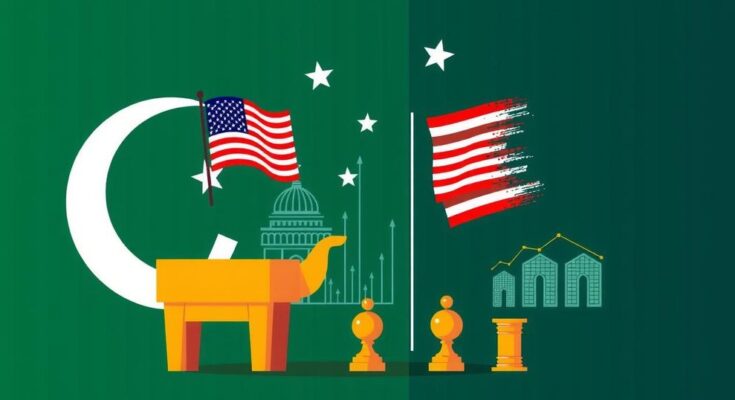The U.S. elections could significantly affect Pakistan’s economy through trade and investment dynamics. With Trump proposing high tariffs and Harris focused on dialogue, the outcomes could alter market access for Pakistani exports. Moreover, both candidates seek to enhance American purchasing power, which may increase demand for Pakistani textiles. Ultimately, the elections represent a critical opportunity and challenge for Pakistan’s economic relationships with the U.S.
The economic ramifications of the upcoming U.S. elections are poised to have significant implications for Pakistan. Donald Trump and Kamala Harris, while differing in vision, share similar economic strategies that may impact the strength of Pakistani exports and investment inflows. Given that the U.S. accounts for nearly a fifth of Pakistan’s total exports, any shift in U.S. tariffs or purchasing policies warrants close scrutiny. The United States serves as a crucial marketplace for Pakistan, importing vital goods predominantly found in the textiles and apparel sector. In 2023, U.S. imports from Pakistan contributed significantly to its export economy. Conversely, foreign direct investment (FDI) from the U.S. remains limited, representing a mere four percent of Pakistan’s total FDI in fiscal year 2024. This illustrates a complex relationship where export reliance coexists with a modest investment footprint. Trump’s proposed ‘America First’ policy, which entails imposing high tariffs on imports from major trading partners like China, might extend to other countries including Pakistan. An increase in tariffs could undermine Pakistan’s competitive edge regarding textiles and clothing, particularly for its middle and lower-middle-income demographics. In contrast, Kamala Harris’s approach leans towards dialogue with China, suggesting that new tariffs may not be levied on Pakistani exports under a potential Democratic administration. Both candidates are advocating for policies aimed at augmenting American purchasing power. Harris aims to expand tax credits for families, which aligns with a general strategy of boosting middle-class finances. Trump proposes increasing tax credits in a similar vein. This collective aim at increasing disposable income for Americans could lead to elevated demand for apparel, benefitting Pakistan’s textile sector, which exported approximately $1.2 billion worth of baby apparel to the U.S. in 2023. On corporate taxation, Harris supports raising the tax rate, potentially impacting the small investments Pakistan receives from the U.S. Conversely, Trump’s proposition to lower corporate taxes for domestic producers may stimulate investment in the U.S. manufacturing sector at the expense of imports, creating further challenges for Pakistan’s export economy. Moreover, the U.S.-China trade war initiated under Trump provided an avenue for alternate export opportunities for Pakistan which was unfortunately not capitalized upon due to internal bureaucratic challenges. Given the current geopolitical climate, if Pakistan addresses its domestic barriers effectively, it may position itself as an attractive alternative for foreign investment, particularly from China. It is therefore vital for Pakistani policymakers to remain adaptive and responsive to the unfolding economic strategies proposed by the U.S. presidential candidates, as these developments will undoubtedly shape the future of Pakistan’s economic landscape.
The interdependence of the U.S. and Pakistan’s economies underscores the significance of U.S. presidential policies on various sectors, particularly trade and investment. Pakistan’s export economy is heavily reliant on U.S. imports, mainly in textiles, which forms a crucial part of its trade dynamics. Additionally, U.S. policies toward China and multinational financial institutions play a pivotal role in shaping Pakistan’s economic landscape and potential growth trajectories. The upcoming elections represent a critical juncture that may alter existing economic relations and create new opportunities or challenges for Pakistan.
In summary, the impact of U.S. electoral outcomes on Pakistan’s economy is profound and multifaceted. With the possibility of changing tariffs and economic strategies under different administrations, Pakistan must optimize its export structures and address domestic challenges to enhance its appeal as an investment destination. The pursuit of favorable trade relations, while navigating complex political landscapes, will be imperative for sustaining economic growth amidst potential adversities.
Original Source: www.dawn.com




